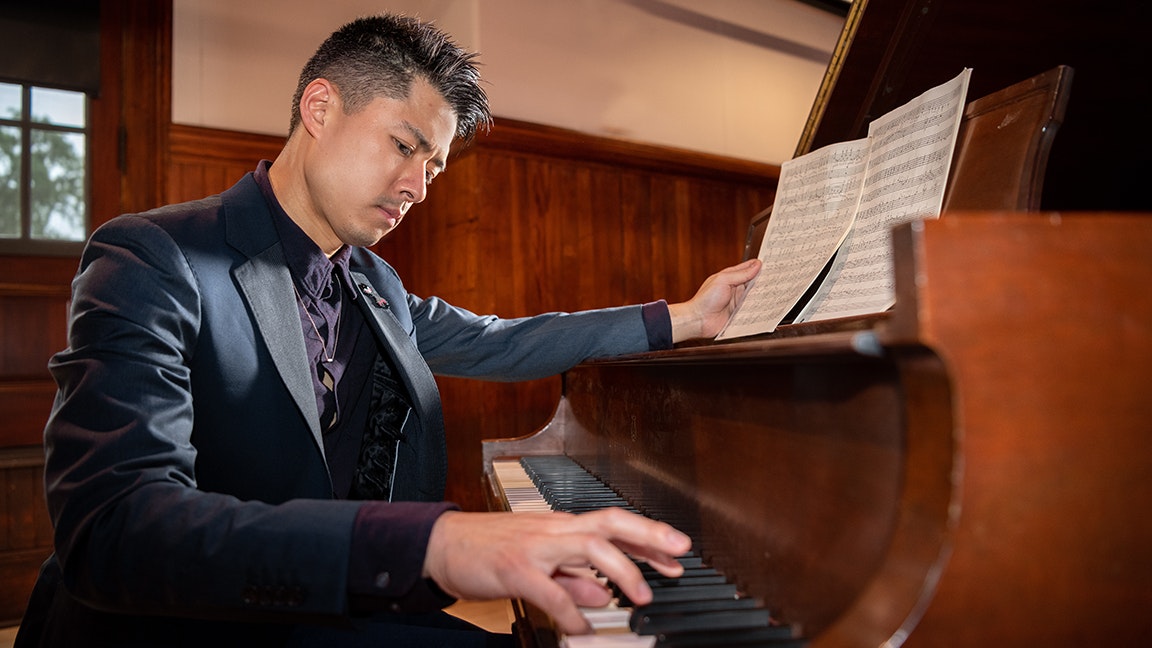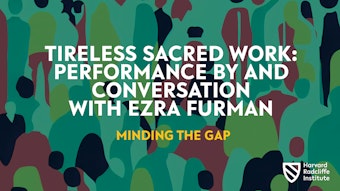Making It Up As He Goes

The musician William Cheng uses improvisation to bring the agency of gaming to the Western classical canon.
William Cheng AM ’12, PhD ’12, RI ’23 plays across boundaries. A gamer and musician, the Dartmouth professor of music is spending his time as the 2022–2023 Rita E. Hauser Fellow at Radcliffe working on a multimodal, genre-bending arts project, “Touching Pitch: A Decolonial Escapade.” Equal parts memoir-treatise, live-recorded collaborative album, and VN-RPG (visual novel role-playing game), “Touching Pitch” will allow users to play as well, choosing from not only recordings of improvisations but also commentary ranging from musicological notes to poetry and memoir.
Radcliffe Magazine: While some of your recent live improvisation performances here at Radcliffe have included dozens of variations on the Ukrainian national anthem, the improvisations you’ve been recording play on musical ciphers based on the names of people you’ve recently met. Would you tell us how this works?
William Cheng: For this part of the project, I’ve chosen new acquaintances because I wanted to emphasize that it’s possible to make music for—and gift music to—strangers. I have a little chart where a note on a keyboard corresponds to the letter of a person’s name. So I scribble down the melodic cipher, and then I play it and see how it sounds. From there, I try to create something interesting.
album i | playing around & thinking out loud | Track 7: MARIA
album ii | pardon the ums | Track 7: OMER
album iii | soundworlds loading | Track 7: BRIT
In October 2022, William Cheng recorded his first three albums of improvisations based on the names of strangers and new friends. Each album contains eight tracks. Here, listen to Track 7 from each of them.
RM: How do gaming and improvised music relate?
WC: Growing up, I played video games and I played music, and I loved that video games often gave you explicit choices and a sense of agency as a player. You could go left or right. You could decide to swing a bat. You could jump. And I often wondered why in the precomposed canonic music that I was learning on the piano, such as a Beethoven sonata or a Chopin nocturne, there seemed to be very little wiggle room in the notes you played.
When I’m playing, the composer is very much a little figure in the corner, and when I was learning certain pieces, I would try to deviate from what they wrote on occasion. I imagined myself in conversation with the ghosts of these composers. They would say, “Yeah, that sounds okay.” Or, “No, I really like the way I wrote it.” This dialogical interplay in my head was not antagonistic or burdensome. It felt very communal.
RM: How do disability and issues of race and nationality play into your music?
WC: There are elements of disability justice in improvisation, especially in a score-reverent tradition such as Western music. Improvisation really compels us to ask ourselves the questions that don't typically come up in a traditional classical education: What does perfection mean? Whom is this music for? What are we willing to sacrifice to achieve it? What does it mean to compete against one another, including in transnational competitions such as the Van Cliburn [International Piano Competition], where it’s not just a clash of elite musicians, it’s a clash of musicians belonging to specific nationalities? As with athletes in the Olympics, music contestants’ nationalities and nationalism are very much played up in these spaces of so-called cultural diplomacy and artistic ambassadorship.
There are alternative cultural models to this agonistic competitive classical music world. It is possible to think about what qualifies as musical and who gets to be musical and who gets to make music. Improvisation can be what people choose to do musically, freely, and expressively. We have a choice as a people to welcome more of that.

For Cheng, improvisation is a way to challenge a traditional classical education. Photo by Lou Jones
RM: You dealt with disability in the form of chronic pain, which kept you from performing for 10 years. How did that affect your relationship with music?
WC: Around 2012, I developed a chronic pain condition that lasted for several years. I took a break from all my work and writing, and I really couldn’t sit at the piano because the pain was in the abdominal wall. Plus, I was depressed and not in the right mindset to play. I felt betrayed by music because I had once believed in its ability to heal and to restore. But listening to music didn’t help. Playing music certainly didn’t help. So I felt like music’s promise was broken. It felt kind of like when you break up with someone or something—you don’t always know why they’ve abandoned you, and you don’t always know how to get back to them.
After three surgeries and the resolution of some of this pain, I began to very gradually start playing for my students at Dartmouth. Once I started offering a larger course about video games and the meaning of life, it made sense to improvise on the video game themes for the students, because they really love it! And then I realized that I wanted to also think about what all this improvising means and why it’s not more commonly done in certain Western art traditions today.
RM: How will these elements play into your final project?
WC: It’s an experimental video game where, through your own decisions as a player, listener, and reader, you get to choose the kind of musical world that we live in. One player’s utopia might be another’s dystopia. Through certain choices, you might end up in a world where improvisation flourishes, or where it becomes extinct and outlawed.
One feature is that you can listen to each track as many times as you want, and you’ll be able to toggle on at least four different parallel streams of annotations. One is the very nerdy music theory stuff, which I enjoy talking about. Another is about feeling, another is about recollection, and another might be experimental poetry. The reason I choose a game format is precisely to encourage people to think about the story of classical music differently and to think about what it still can be in the future. Do we continue to go down this road where improvisation in this tradition is just on the fringes? Or do we want to center it?

On Thanksgiving morning (November 24, 2022), Cheng improvises on John Williams's themes from the 1993 film Schindler's List.
This conversation was edited and condensed.
Clea Simon ’83 is a novelist whose most recent title is Hold Me Down.








